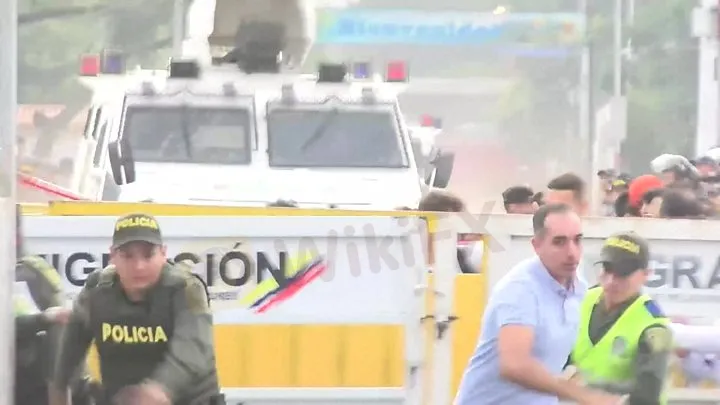简体中文
繁體中文
English
Pусский
日本語
ภาษาไทย
Tiếng Việt
Bahasa Indonesia
Español
हिन्दी
Filippiiniläinen
Français
Deutsch
Português
Türkçe
한국어
العربية
Venezuela crisis: Univision team 'briefly detained' after Maduro interview
Abstract:Image copyrightReutersImage caption The crew included award-winning Mexican-American journalist Jor
Image copyrightReutersImage captio
The crew included award-winning Mexican-American journalist Jorge Ramo
US broadcaster Univision says its team was briefly detained in the Venezuelan presidential palace where they had been interviewing President Nicolás Maduro.
The incident happened after award-winning journalist Jorge Ramos showed Mr Maduro images of Venezuelans eating from a bin lorry, the network says.
Their equipment was confiscated.
Venezuela's Information Minister Jorge Rodríguez said the government had welcomed hundreds of journalists but it did not support “cheap shows”.
Univision, the leading Spanish-language TV network in the US, said the six-member crew had been released after almost three hours but that their recording and personal belongings had not been returned.
Speaking on Univision, Mr Ramos, a veteran Mexican-American journalist, said Mr Maduro “had not liked” some of the questions about “the lack of democracy in Venezuela, torture, political prisoners and the humanitarian crisis”.
What next for Venezuelas opposition?
Venezuela crisis - in nine chart
“He got up after I showed him videos of young people eating out of a bin lorry,” he said of the interview at the Miraflores palace in the capital, Caracas.
What I told Nicolás Maduro is that millions of Venezuelans and many governments around the world don't consider him a legitimate president but a dictator."
During their detention, Mr Ramos and Univision Vice President María Martínez were kept for “a few minutes” in a separate room where the lights were turned off, the broadcaster said.
The Univision crew will be deported on Tuesday, Reuters news agency reports.

Media playback is unsupported on your device
Media captionThe moment Venezuelan troops crashed through border into Colombia
Natalie Southwick, Central and South America programme co-ordinator of the Committee to Protect Journalists, said: By shutting down an interview and censoring one of Latin America's most high-profile reporters, Nicolás Maduro has demonstrated his fundamental disregard for the press."
Last month, several local and foreign journalists were briefly detained while working in Caracas. Some ended up being deported.
Who is buying Venezuela's oil?
Genuine aid or a Trojan horse?
Earlier, a group of Latin American countries and Canada said Mr Maduro was a threat to peace and security in the region and called for his immediate exit, a democratic transition and free elections.
Meeting in the Colombian capital, Bogotá, the Lima group urged the International Criminal Court to consider whether Venezuela was guilty of crimes against humanity for refusing to allow aid into the country.
At least two people died in Saturday's clashes between civilians and troops loyal to Mr Maduro that blocked the entrance of foreign aid organised by opposition leader and self-declared interim President Juan Guaidó.
Mr Maduro says the aid efforts are part of a US-orchestrated coup.
In other developments:
More than 100 soldiers are said to have defected since the weekend. Speaking to the BBC, some of them say they fear for the safety of their familie
The US has announced new sanctions against four Venezuelan state governors allied with Mr Maduro
The UN Security Council is due to meet later on Tuesday to discuss the crisi
Please upgrade your browser to view this content.
Timeline: Venezuela crisishide
How the story unfolded
What happened next?Show allWas this timeline useful?YesNoThank you for your feedback.
Share this chatbot.
Disclaimer:
The views in this article only represent the author's personal views, and do not constitute investment advice on this platform. This platform does not guarantee the accuracy, completeness and timeliness of the information in the article, and will not be liable for any loss caused by the use of or reliance on the information in the article.
WikiFX Broker
Latest News
BSP Shuts Down Uno Forex Over Serious AML Violations
ACY Securities Expands Global Footprint with South Africa Acquisition
Tokyo Police Arrest 4 for Unregistered FX Trading Scheme
Rupee gains against Euro
WikiEXPO Global Expert Interview: The Future of Financial Regulation and Compliance
DFSA Warns of Fake Loan Approval Scam Using Its Logo
Consob Sounds Alarm: WhatsApp & Telegram Users Vulnerable to Investment Scams
CySEC Revokes UFX Broker Licence as Reliantco Halts Global Operations
GCash, Government to Launch GBonds for Easy Investments
Bitcoin ETF Options Get Closer to Reality with CFTC Clarification
Currency Calculator



